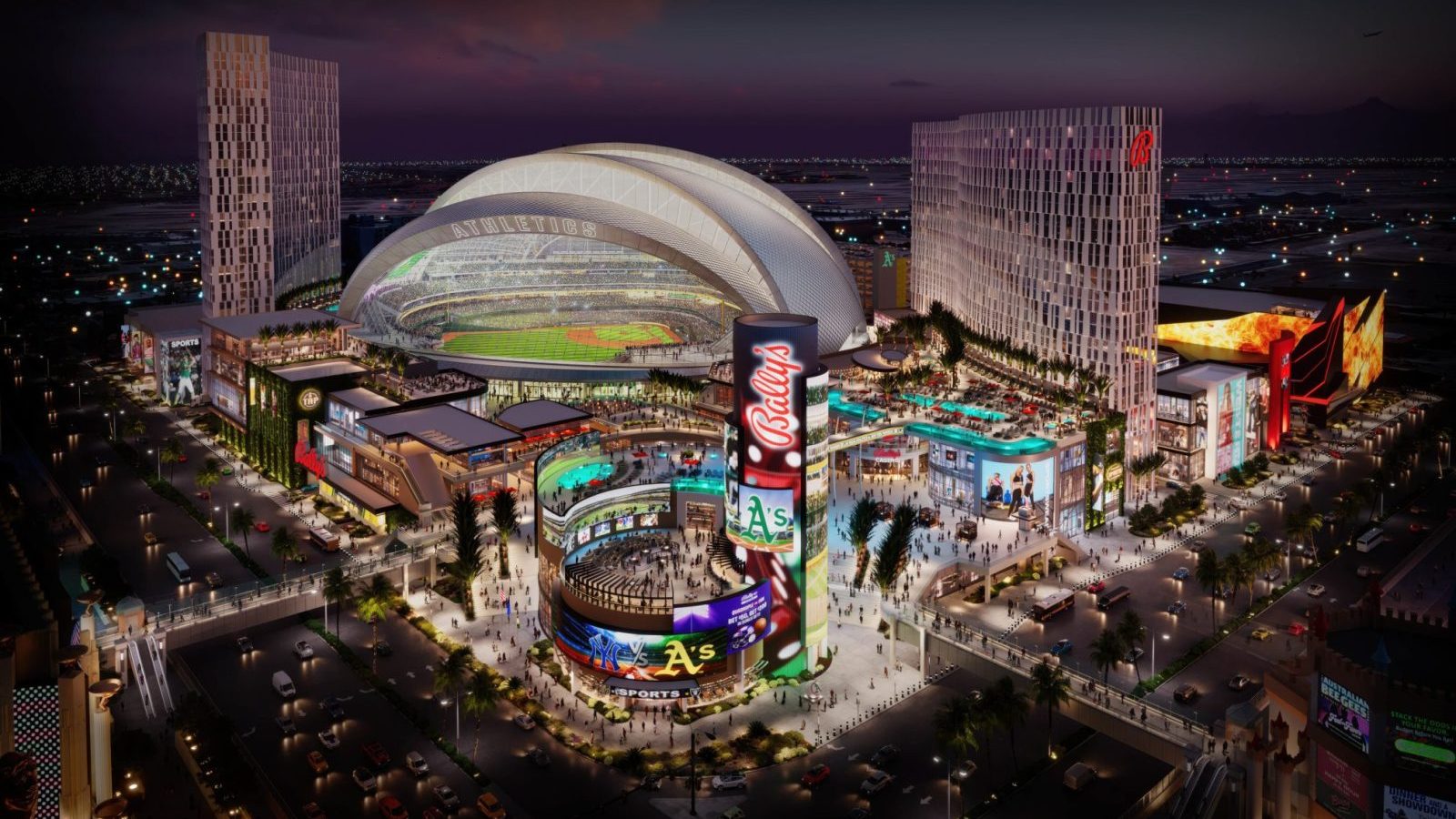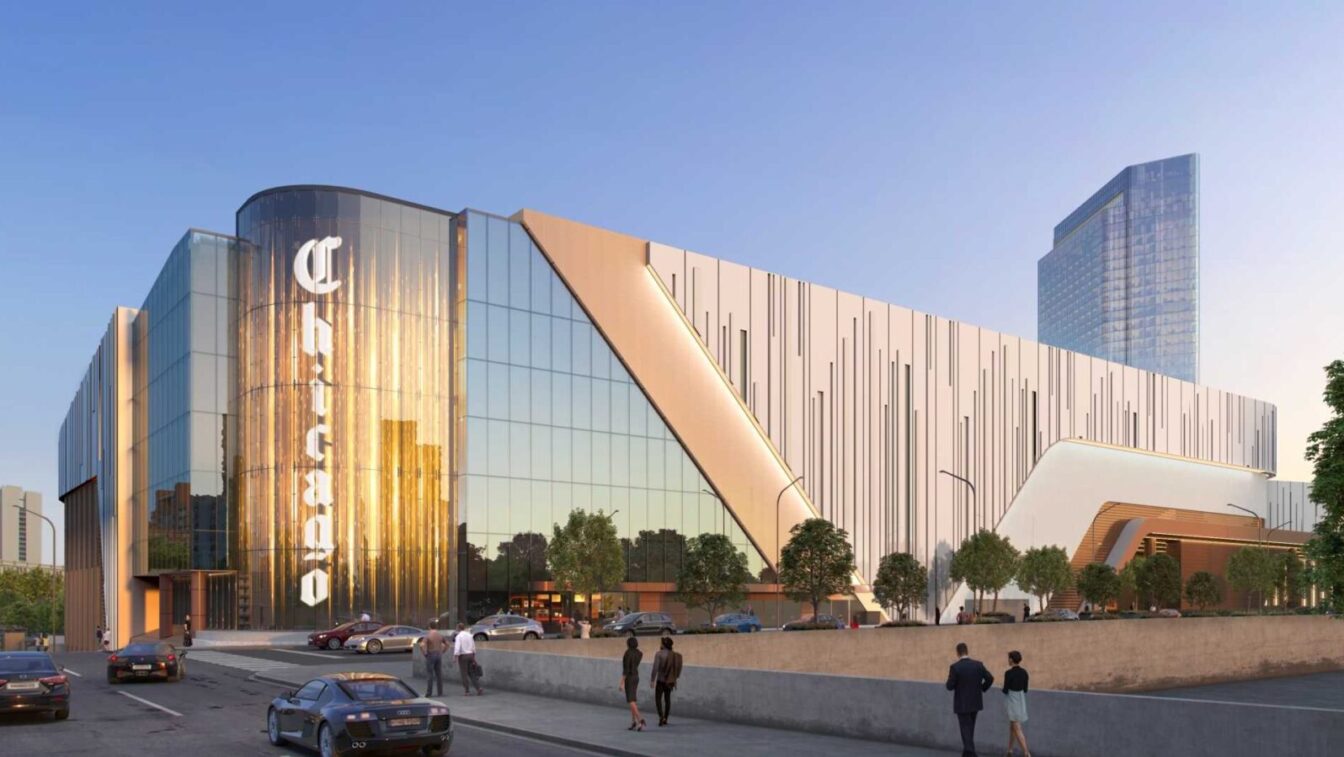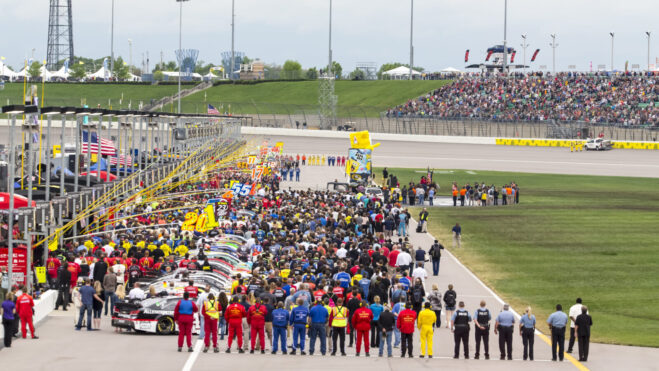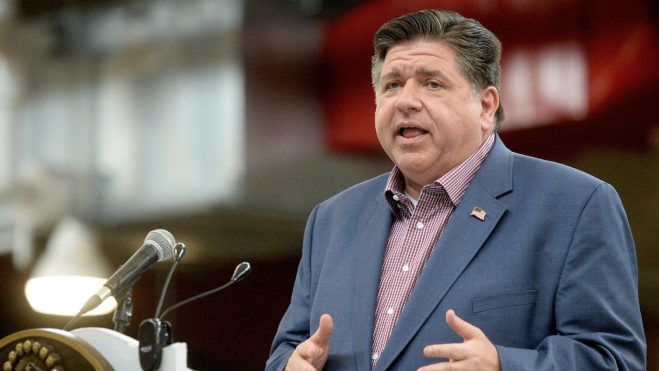Bally’s Catches The Car
The resort operator is sharing renderings for Vegas while among last four standing in New York
6 min

October’s first week brought a dramatic pivot for Bally’s Corp. It received 5-1 approval from its Community Advisory Committee (CAC) for its Bronx casino proposal. And company Chairman Soo Kim popped up in Las Vegas to unveil a new rendering of a planned megaresort on the former site of the Tropicana.
In a few days, Bally’s had gone from having one mega-resort project on its front burner to a potential threesome, each costing billions of dollars. What was not in evidence was how Bally’s intends to pay for its grand scheme to simultaneously build a trio of casino castles.
Still, Kim was able to bask in a Big Apple victory lap. When Bally’s bought the then-Trump Links for $60 million, it was viewed as a shallow-pocketed and distant contender for a New York City casino license.
Many called, few chosen
However, in a development characteristic of the unpredictable advisory committee process, Bally’s marched from longshot status to finalist. Up to three casino licenses can be handed out by New York state at the end of this year. When the dust from the CAC process settled, Bally’s found itself among the final four — and possibly closer still.
Improbably, Kim’s company had done what well-heeled contenders like Wynn Resorts, Las Vegas Sands, Caesars Entertainment, Mohegan Sun, and Greenwood Gaming could not: muster community support. Now it finds itself vying with MGM Resorts International, Genting Berhad, and Hard Rock International for the brass ring.
Bally’s chances received a boost in the Oct. 1 Politico newsletter, which predicted rough sailing ahead for MGM Empire City. The modified horse racing venue was described by CAC Chairman James Cavanaugh as an “aging slot parlor,” one that consumers wouldn’t travel to visit. Ironically, Cavanaugh’s had been one of the six votes in MGM’s favor — and was the surrogate of Yonkers Mayor Mike Spano.
Were MGM not to receive a Class III license from the state, its future would look very bleak indeed. While Hard Rock, Genting (at Resorts World New York City), and Bally’s could all offer slot machines and table games, MGM would be stuck with video lottery terminals. Eventual failure would seem not just possible but commercially inevitable.
MGM furthermore carries baggage in the form of a federal settlement over money laundering at its Las Vegas casinos. New York State Gaming Commission Chairman Brian O’Dwyer has more than hinted that past malfeasances by casino applicants would count against them in the Empire State.
Presidential payday
Bally’s is also lugging extra weight in the form of President Donald Trump. When purchasing Trump Links, Bally’s agreed to a retroactive increase in the sales price to $175 million if a casino is built on the property, with the additional monies tagged as a “gaming event fee” and payable to the Trump Organization.
This kickback, which New York City Mayor Eric Adams has been at pains to salvage for the Trumps, is invariably mentioned when the topic of Bally’s New York is broached. The $115 million question is whether state gaming regulators will choke on the blatant presidential payola. (Since Bally’s President George Papanier used an autopen to sign the relevant document, could it — per Trumpian logic — be deemed null and void?)
Should it make the final cut, Bally’s will have 10 days to come up with the $115 million. Small wonder that the company has been selling real estate and reworking its credit facilities. Kim also has to whittle down $5.7 billion in debt, in hopes of attracting financiers. His Chicago ambitions stalled when Bally’s found itself maxed in borrowing capacity.
The good news for Kim is that the bulk of Bally’s debt doesn’t come due for three more years. The less-good news is that is when he has promised to be opening his Las Vegas mega-resort.
Significantly, Bally’s “has yet to disclose construction details” for its Bronx project, compared to the 2026 timeline for a converted Resorts World NYC and 2027 for Empire City. (Hard Rock’s Metropolitan Park is targeted for 2030.) When he released renderings of the proposed casino, Kim metaphorically brandished “letters of confidence” from unnamed financial institutions. It remains to be seen whether the state will want to see more concrete evidence of wherewithal.
Hallelujah chorus
If Kim has had to contend with a skeptical Gotham media, scribes in Las Vegas are downright compliant. The release of a single rendering of a reimagined Tropicana site was enough to prompt on-cue media hosannas. “Vibrant” hailed the Las Vegas Review-Journal’s Mick Akers. Several Sin City TV stations carried similarly upbeat reports. Even the normally circumspect Las Vegas Advisor ran Bally’s rendering on its October cover.
And a rendering was all Kim had to offer eager reporters, aside from some vaguely sketched business plans, which include having parts of the mega-resort open in time for the 2028 Major League Baseball season. That gives Kim a 2½-year lead time, whereas the central facet of the resort, a $2 billion-plus stadium for the currently-Sacramento-based Athletics, is already under construction and has been for several months, targeted for a spring 2028 debut.
As described to the Nevada Independent’s Howard Stutz, Kim intends to lead with retail and dining, and possibly also live music. He stressed to Stutz that 75% of Las Vegas Strip revenue is non-gambling in nature, hinting at an opening sans casino gaming.
History on the Strip has not been kind to casinos that open in staggered, incomplete fashion. The reworked Aladdin (now Planet Hollywood Resort) was short-lived and Sheldon Adelson’s The Venetian took a long time to live down its famously botched debut (when invited guest Sophia Loren had to be put up in a rival hotel down the street). Kim’s decision to lead with a two-phase, casino-light strategy can be said to be somewhere between audacious and foolhardy.
However, if there is one thing at which Kim is an undisputed virtuoso, it is playing the Las Vegas media community like a silver-toned harp. In spite of Bally’s well-publicized money troubles in Chicago, reporters refrained from asking how Kim was going to swing the financing for Bally’s Las Vegas and on such short notice. Even the veteran Stutz was too polite to pose the question and Kim was volunteering no monetary details.
Uneasy partners
Ironically, just a week earlier, Stutz had been the one to shine a light on the increasingly frosty relationship between Bally’s and its erstwhile benefactor, Gaming & Leisure Properties Inc. (GLPI). The latter is a real estate investment trust (REIT), established by former executives of Penn Entertainment, to agglomerate casino and hotel properties, then lease them to operators.
It’s intended to be a low-outlay/high-yield business and it’s one for which cash-hungry Bally’s has provided much real estate fodder, liquidating its U.S. casino portfolio into GLPI’s portfolio. However, $1.7 billion Bally’s Chicago has betrayed some strains in the formerly cheery relationship.
In essence, Bally’s ran out of money to build its Chicago River pleasure palace, one that would tax even Kubla Khan’s coffers. GLPI had to step in and pay for the majority of construction, even to the extent of tasking one of its own executives to get the place built. In return, GLPI will own the majority of Bally’s Chicago once it is finished.
Mind you, REITs are not designed to erect resorts but to simply manage them for their shareholders’ benefit. GLPI CEO Peter Carlino and his team, had they wanted to supervise megaresort construction, would probably have stayed put at Penn. Instead, they find themselves doing Kim and Papanier’s work for them.
This seems to chafe on GLPI management, whose earnings-call remarks about an ongoing commitment to Bally’s have grown more and more cautious, and conditional. As owner of the Tropicana site and financier of the old resort’s demolition, GLPI is in for a penny … or $175 million.
Whether it is also in for a pound (unspecified billions) is open to speculation. On GLPI’s most recent earnings call, Carlino said the company had yet to “determine how much, if any, additional funding we may provide to support the construction.” (Emphasis added.)
It may not help that Kim has a habit of forgetting to thank his GLPI benefactors when doing media for his projects. Bally’s New York, conspicuously, is going forward without any commitment, let alone expression of interest, from GLPI.
A hat trick?
Speaking of habits, Kim has one of haring off in pursuit of mega-expensive mega-resorts without having the means to pay for them. In 2022, he was kicking the tires of the Japan market, where MGM Osaka will cost $30 billion and is taking 5½ years to build — costs and timelines that are a far cry from Bally’s venerable, flagship casino in Atlantic City, the only property in the market to be currently operating in the red.
In addition to developing two — and maybe three — American mega-resorts, Kim and Papanier must also wrap their brains around the new (to them) Australia market. In the midst of his Gotham pursuit, Kim took a hard left into troubled Star Entertainment and promptly confessed discomfort with its high-end-customer orientation.
Still, Kim has been able to keep his house of cards upright longer than some would have expected. If he can pull a $4 billion rabbit out of his hat in the Bronx or an even bigger one on the Strip, it will be his best magic trick yet.






